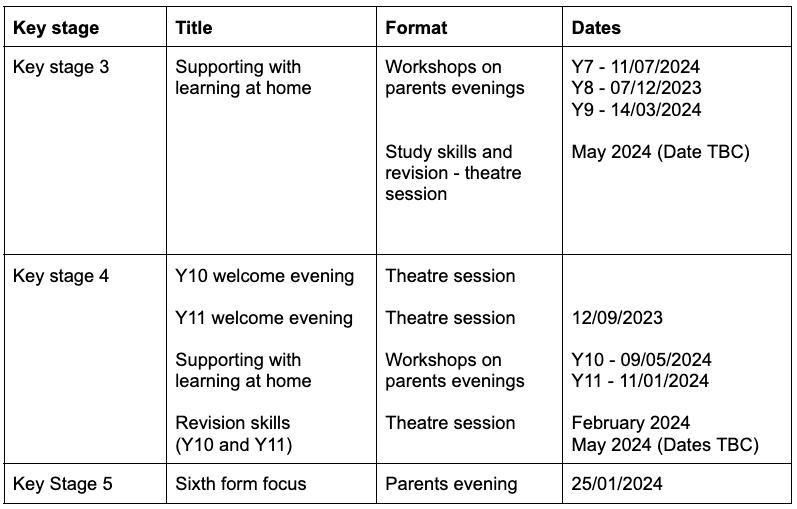At Archbishop Sentamu Academy we work in partnership with families to ensure that children have the support they need to thrive and achieve in school. Supporting learning at home is vitally important to your child’s view of education and achievement. As your child gets older, you may feel less connected to their school experience and less confident in being able to help. There are simple things you can do to support your child with learning at home, whatever their age might be.
Learning at home can be done in a variety of ways, depending on your child’s age, interests and the point they are in their educational journey. You can build your child’s confidence by being optimistic about learning yourself. Obviously, one of the major ways you can support your child’s educational achievement and development is by ensuring that they are in school regularly.
Homework
Showing interest in your child’s homework is important, as it not only shows you care but will also give you insight into what they are learning and how they are progressing. It builds connection, which ultimately will serve to give your child the self-esteem and confidence that will help them succeed. Regular homework sessions will ensure you stay empathetic to your child’s workload and stress levels. This is particularly important for those children that are preparing for exams.
Routines
It is best to set up a designated space for homework, this could be on the table, in their bedroom or in a public library, if need be. It can be as elaborate or as simple as you can afford, as long as there is somewhere calm and uncluttered that your child knows is their area for doing their homework.
Try to set a routine, if you can. Discuss with your child what time they think would be best and try to make it a habit. Before they start, make sure they have had something to eat and drink. Nobody can focus when they are hungry or thirsty!
Helping with homework
Working with your child on their homework provides a great opportunity to connect with them and their schoolwork. Be supportive, but don’t try to take over or do it for them. If it appears that your child is really struggling with homework from some subjects, it could be that you need to raise it with their teacher.
Homework Club and Lesson 6
We offer a weekly opportunity for students to complete homework after school under supervision by an experienced Teaching Assistant. This operates each Thursday, 3pm to 4pm, in the Rainbow Room. All children are welcome to attend and make use of school facilities, such as computers and printers. For our Year 11 students who are sitting GCSEs, we offer teacher-supported revision or Lesson 6. Students are regularly invited for sessions and parents are informed. Please encourage your child to take advantage of this excellent revision opportunity.
Reading
Reading for pleasure makes a big difference to children’s educational performance. Research shows that children (and adults) that read for enjoyment every day not only perform better in reading tests, but also develop a broader vocabulary, increased general knowledge and a better understanding of the world around them and other cultures.
At Archbishop Sentamu Academy, we have a well-stocked library on the first floor that is available for children to use at break and lunchtime. Not all children love reading and there are some simple things you can do at home if you have an unwilling reader!
The school also runs a reading programme in Key Stage 3 called Reading Plus, which is a web based reading programme. Reading Plus is an adaptive reading and literacy programme that helps students to improve their reading efficiency and fluency, rapidly accelerating reading growth and supporting students to become independent readers. The programme has been proven to help students to gain the equivalent of 2.5 years of reading growth in just one school year. It’s an exciting opportunity for students to make rapid progress, not just in their reading ability but also in all of their wider subjects. You can find out more about this programme here: https://www.readingsolutionsuk.co.uk/reading-plus/ . Every student has their own unique log in, given to them by their English teacher. Reading Plus is given to students as part of their English homework: every week, your child should be logging into the Reading Plus website and reading at least 4 Reading Plus articles through the online library. They can log in to the website using their laptop, tablet or mobile phone. If you do not have internet access at home, a homework club is available every Thursday in the Rainbow room on the 4th floor from 3pm until 4pm. They can also access this programme at any time to accelerate their reading comprehension and fluency. Your child may also receive Reading Plus intervention as part of our package to support reading across school.
Assessments and revising for exams
Children will have exams and assessments throughout their time at Archbishop Sentamu Academy and building good study skills from year 7 onwards will help them to achieve their potential in their GCSEs in year 11.
In year 7, like most secondary schools, all children at ASA take National Group Reading Tests (NGRT) and a cognitive abilities test (CATs). These test children’s reading ages and comprehension skills as well as their verbal (thinking with words), quantitative (thinking with numbers) and non-verbal (thinking with shapes and space). These help teachers to plan effectively for your child’s learning and also to identify any children that may need additional support and/or intervention.
These tests are followed up in year 8 and 9 and allow us to continue supporting your child effectively.
In Key Stage 3 (Year 7, 8 and 9), students will have 2 full sets of exam periods per year. During the academic year 2023/2024, these exams will be in January and May/June and will be done in classrooms with their regular teachers. The January assessment window is between 9/1/24 and 26/1/24. The May/June assessment window is between 20/5/24 and 14/6/24.
In Key Stage 4 (Year 10 and 11), students will sit PPEs (mock examinations); these are run in the hall and smaller classrooms for children that require additional support with access arrangements. They replicate the GCSE examination conditions that children will sit at the end of year 11 and provide teachers and students with information about what they have learnt securely and what needs re-teaching. The Yr 11 Spring PPE assessment window is between 19/2/24 and 1/3/24. The Yr10 Summer PPE assessment window is between 17/6/24 and 28/6/24.
In Key Stage 5 (Year 12 and 13), students will also sit PPEs (mock examinations) in the subjects that have an examinable component. The Yr 12/13 Spring PPE assessment window is between 29/1/24 and 9/2/24.
Supporting with revision at home
For all exams, preparation is key to success. Before they start revising, you could help them to create a revision timetable. The timetable should provide achievable goals, dividing their time between each subject. The get revising website linked below has an excellent, online, template for this purpose and is highly recommended for use at any age.
Revision Timetable Maker / Study Planner (getrevising.co.uk)
Encourage them to revise the subject they find the hardest first when energy levels are at the highest. Also, get them to use revision checklists provided by their teachers to make sure they revise the relevant content.
Supplies
Highlighters, coloured pens and note cards can be really helpful for revision and can be bought very cheaply from discount shops, students can also cash in their reward points for these items. If past papers are available, build in practice as part of their revision timetable.
Techniques
There are lots of different ways they could revise effectively, but please encourage them to do something with the information. For example, they could produce mind maps, flashcards, diagrams and flowcharts. If they are up for it, you could get the whole family involved in helping with revision. Stick notes and posters around the house and quiz each other. You could also test them with a Q and A session or get them to speak about a topic for a set amount of time such as 2 minutes. They will be surprised by how much they know and it will highlight the areas they need to focus on.
Down time
Make sure they build in time for relaxing and socialising too. It is important for them to look after their mental and physical well being during what can be a stressful time.
To support you, we run revision and study support skill workshops throughout the year that parents are invited to come to. More information will come out via Edulink nearer to the dates.



